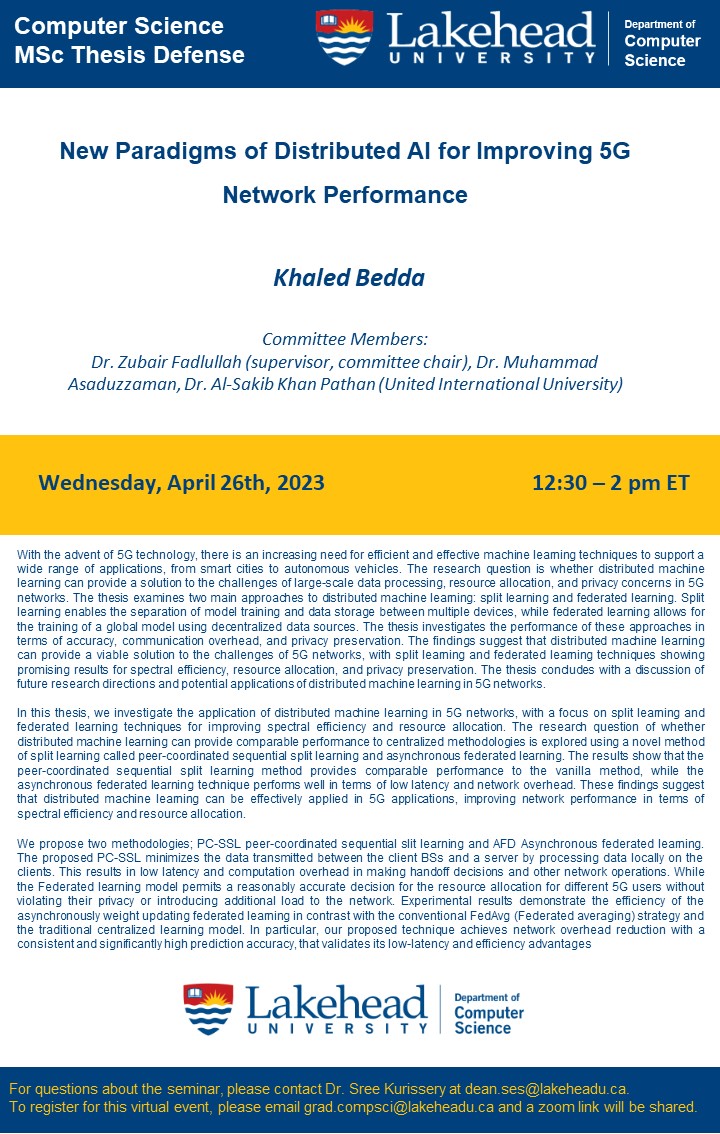Computer Science Department Thesis Defense - Khaled Bedda

Please join the Computer Science Department for the upcoming thesis defense:
Presenter: Khaled Bedda
Thesis title: New Paradigms of Distributed AI for Improving 5G Network Performance
Abstract: With the advent of 5G technology, there is an increasing need for efficient and effective machine learning techniques to support a wide range of applications, from smart cities to autonomous vehicles. The research question is whether distributed machine learning can provide a solution to the challenges of large-scale data processing, resource allocation, and privacy concerns in 5G networks. The thesis examines two main approaches to distributed machine learning: split learning and federated learning. Split learning enables the separation of model training and data storage between multiple devices, while federated learning allows for the training of a global model using decentralized data sources. The thesis investigates the performance of these approaches in terms of accuracy, communication overhead, and privacy preservation. The findings suggest that distributed machine learning can provide a viable solution to the challenges of 5G networks, with split learning and federated learning techniques showing promising results for spectral efficiency, resource allocation, and privacy preservation. The thesis concludes with a discussion of future research directions and potential applications of distributed machine learning in 5G networks.
In this thesis, we investigate the application of distributed machine learning in 5G networks, with a focus on split learning and federated learning techniques for improving spectral efficiency and resource allocation. The research question of whether distributed machine learning can provide comparable performance to centralized methodologies is explored using a novel method of split learning called peer-coordinated sequential split learning and asynchronous federated learning. The results show that the peer-coordinated sequential split learning method provides comparable performance to the vanilla method, while the asynchronous federated learning technique performs well in terms of low latency and network overhead. These findings suggest that distributed machine learning can be effectively applied in 5G applications, improving network performance in terms of spectral efficiency and resource allocation.
We propose two methodologies; PC-SSL peer-coordinated sequential slit learning and AFD Asynchronous federated learning. The proposed PC-SSL minimizes the data transmitted between the client BSs and a server by processing data locally on the clients. This results in low latency and computation overhead in making handoff decisions and other network operations. While the Federated learning model permits a reasonably accurate decision for the resource allocation for different 5G users without violating their privacy or introducing additional load to the network. Experimental results demonstrate the efficiency of the asynchronously weight updating federated learning in contrast with the conventional FedAvg (Federated averaging) strategy and the traditional centralized learning model. In particular, our proposed technique achieves network overhead reduction with a consistent and significantly high prediction accuracy, that validates its low-latency and efficiency advantages
Committee Members:
Dr. Zubair Fadlullah (supervisor, committee chair), Dr. Muhammad Asaduzzaman, Dr. Al-Sakib Khan Pathan (United International University)
Please contact grad.compsci@lakeheadu.ca for the Zoom link.
Everyone is welcome.

